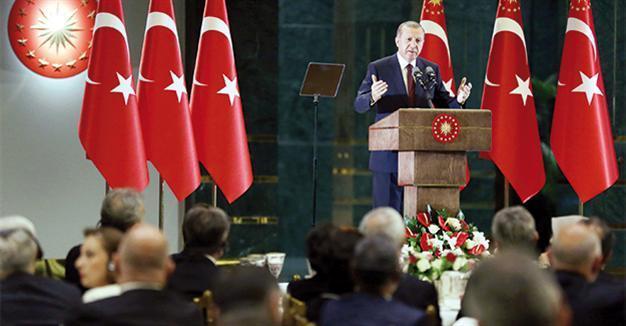Erdoğan will go to NATO Warsaw Summit with critical messages on Black Sea, Syria
Erdinç Çelikkan - ANKARA

AA photo
President Recep Tayyip Erdoğan will participate in NATO’s Warsaw Summit scheduled to take place in early July at a critical moment for the alliance, with his major focus being the need to enhance defense and deterrence in the Black Sea region, as well as reiterating Ankara’s uneasiness over the emergence of a self-governing Kurdish entity on Turkey’s southern border.
At the July 8-9 summit, NATO’s 28 member states will take the next steps towards enhancing a forward presence in the eastern part of the alliance and projecting stability beyond NATO’s borders.
During the summit, Erdoğan is expected to underline the need and significance of “global cooperation” against groups such as the Islamic State of Iraq and the Levant (ISIL), the outlawed Kurdistan Workers’ Party (PKK), the Democratic Union Party (PYD) and the PYD’s militia forces, the People’s Defense Units (YPG).
Turkey regards both the YPG, which is fighting ISIL jihadists, and the PYD as off-shoots of the PKK, which has been in reignited conflict with Turkish security forces since July 2015.
Erdoğan will also highlight the need to strengthen NATO’s capability in the Black Sea.
Erdoğan drew attention to the issue in a speech delivered at the 10th Balkan Countries Chiefs of Defense Conference held in Istanbul in May. Underlining the increasing importance of the Warsaw Summit, Erdoğan had said, “I would like to reemphasize that we will continue our contributions to your efforts of capacity-building under NATO as well. We should transform the Black Sea into a basin of stability again on the basis of cooperation among riparian countries around the Black Sea.”
Erdoğan then recalled NATO Secretary General Jens Stoltenberg’s visit to Ankara in the second half of April.
“During his [Stoltenberg’s] visit I told him: ‘You are not visible in the Black Sea. And your invisibility in the Black Sea turns it into a Russian lake, so to speak.’ As riparian countries we should live up to our responsibilities. As NATO members, we should take all required steps in all spheres, including the sea, air and ground. Otherwise, history shall not forgive us. And we should also deepen our existing cooperation in accordance with an approach of regional inclusiveness. I would like to express that we will keep sharing our proposals on this issue with riparian countries of the Black Sea in the coming days,” the president told the Balkan countries’ chiefs of defense.
Carter: Leading source of instability emanating from NATO’s southern flank
Meanwhile, speaking at a press conference in Brussels on June 15 after this week’s NATO defense ministers’ conference, U.S. Defense Secretary Ashton Carter touched upon the U.S.-led coalition campaign to deliver a lasting defeat to ISIL.
Carter said he and the rest of the NATO defense ministers agreed that ISIL’s parent tumor in Iraq and Syria and its metastasis were among the leading sources of instability emanating from NATO’s southern flank.
The effort had received contributions from nearly every NATO member, but every nation and the NATO alliance itself needed to do more, Carter added.
“At this ministerial [conference], we discussed specific ways that NATO could contribute more directly to the counter-ISIL campaign, including by providing NATO [Airborne Warning and Control System] aircraft and by conducting training and defense capacity-building for the Iraqi security forces in Iraq rather than in Jordan,” he said.
In northern Syria, Carter said, the coalition was enabling Syrian-Arab coalition forces working to envelop Manbij, an operation critical for helping seal the Turkish border and cut off the flow of foreign fighters in and out of Syria.
“Another challenge emanating from NATO’s southern flank is the migrant and refugee crisis, which NATO is helping address in the Aegean Sea,” the secretary said. “Soon, the United States will be contributing to that NATO activity by sending the USNS Grapple to support it.”
